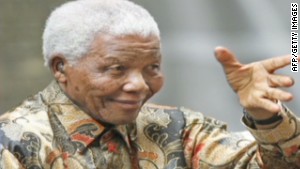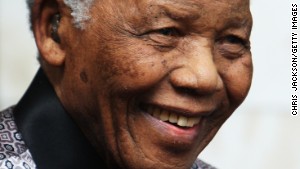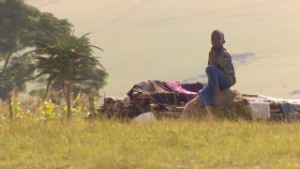Taliban Step Toward Afghan Peace Talks Is Hailed by U.S.
WASHINGTON — The Taliban signaled a breakthrough in efforts to start
Afghan peace negotiations on Tuesday, announcing the opening of a
political office in Qatar and a new readiness to talk with American and
Afghan officials, who said in turn that they would travel to meet
insurgent negotiators there within days.
If the talks begin, they will be a significant step in peace efforts
that have been locked in an impasse for nearly 18 months, after the
Taliban walked out and accused the United States of negotiating in bad
faith. American officials have long pushed for such talks, believing
them crucial to stabilizing Afghanistan after the 2014 Western military
withdrawal.
But the Taliban may have other goals in moving ahead. Their language
made clear that they sought to be dealt with as a legitimate political
force with a long-term role to play beyond the insurgency. In that
sense, in addition to aiding in talks, the actual opening of their
office in Qatar — nearly a year and a half after initial plans to open
it were announced and then soon after suspended — could be seen as a
signal that the Taliban’s ultimate aim is recognition as an alternative
to the Western-backed government of President Hamid Karzai.
By agreeing to negotiations, the Taliban can “come out in the open,
engage the rest of the region as legitimate actors, and it will be very
difficult to prevent that when we recognize the office and are talking
to the office,” said Vali Nasr, a former State Department official who
is the dean of the Johns Hopkins School of Advanced International
Studies.
The United States, already heading toward its military exit, has little
to offer beyond prisoner exchanges, and the Taliban are “not trying to
help our strategy,” Mr. Nasr warned. “They’re basically trying to put in
place their own strategy.”
The Taliban overture coincided with an important symbolic moment in the
American withdrawal: the formal announcement on Tuesday of a complete
security handover from American troops to Afghan forces across the
country. That shift had already become obvious in recent months as the
Afghan forces had tangibly taken the lead — and as the Taliban had
responded by increasing the tempo of attacks against them.
Yet since at least 2009, even top American generals maintained that a
permanent peace could not be won on the battlefield, and American
diplomats have engaged in nearly three years of holding secret meetings
and working through diplomatic back channels to lay the groundwork for
talks to begin.
The opening for Tuesday’s developments appeared to come in the third
week of May, when the Qataris told the United States that the Taliban
might be ready to start talking again, according to an American official
with knowledge of the talks.
To that point, diplomats and intermediaries from Germany, Norway and
Britain also played crucial roles, administration officials said
Tuesday, and some said they believed Pakistan had played a more active
role in recent months to urge the exiled Taliban leadership to move
toward talks.
President Obama called the Taliban’s announcement “an important first
step toward reconciliation,” but cautioned that it was only “a very
early step.”
“We anticipate there will be a lot of bumps in the road,” Mr. Obama said
at a meeting with President François Hollande of France at the Group of
8 summit meeting in Northern Ireland.
There have been plenty of bumps already. Over the last 18 months, the
peace effort has encountered pressure from nearly every quarter at one
time or another: Mr. Karzai, the exiled Taliban leadership, the
Taliban’s patrons in Pakistan and critics in the United States who have
reacted coolly to what they perceive as talking to terrorists.
A pair of Afghan mullahs made the Taliban announcement in a televised
address from Doha, the capital of Qatar, cutting a red ribbon at the
villa that will serve as the office. The Taliban’s political and
military goals “are limited to Afghanistan,” said Muhammad Naim, the
Taliban spokesman who read the statement.
The Taliban “would not allow anyone to threaten the security of other
countries from the soil of Afghanistan,” Mr. Naim added, and they seek
“a political and peaceful solution” to the conflict.
The appearance seemed to answer one immediate question hanging over the
peace efforts: who was empowered to speak for the Taliban’s secretive
leader in exile, Mullah Muhammad Omar.
American officials said recent signals had made them sure that the Qatar
office was being opened by Mullah Omar’s true intermediaries. As well,
the Taliban’s wording on Tuesday adhered to previous requirements by
American officials, officials said.
In particular, the statement represented the beginning of what is hoped
will become a public break with Al Qaeda, which the Taliban sheltered
before the Sept. 11, 2001, attacks, the officials said.
Along with getting the Taliban to disown international terrorist groups,
the ultimate goal of the talks, from a Western and Afghan government
point of view, is to persuade the Taliban to disarm and accept the
Afghan Constitution.
While Western officials have in the past suggested that the Constitution
can be changed, the Obama administration stressed Tuesday that
accepting the charter’s “protections for women and minorities” was
considered a condition of any eventual peace deal.
In the shorter term, American officials said, envoys were to meet this
week with Taliban representatives in Qatar, and then members of
Afghanistan’s High Peace Council, which is to represent the government
in talks, were to travel to the Persian Gulf emirate to sit down with
the insurgents.
But the first meetings will probably feature little more than an
exchange of agendas, another senior administration official said,
cautioning against expectations that the talks might yield substantive
results any time soon. “There is no guarantee that this will happen
quickly, if at all,” the official said.
Talks between the United States and the Taliban “can help advance the
process, but the core of it is going to be negotiations among Afghans,
and the level of trust on both sides is extremely low, as one would
expect,” the official said. “So it is going to be a long, hard process
if indeed it advances significantly at all.”
Mr. Karzai signaled his acceptance of the office’s opening at a ceremony
on Tuesday celebrating the transfer of all security responsibilities
across Afghanistan to Afghan forces. But he made it clear that he wanted
any talks moved to Afghanistan as soon as possible, and his support for
the process getting under way in Qatar seemed tepid.
“The reason we are worried is the hands of the outsiders,” he said,
focusing his comments on his government’s concerns. “We will go forward
cautiously.”
Among Mr. Karzai’s concerns is that the Taliban will use the Doha office
as a forum to try to re-establish their political legitimacy,
especially in international circles, rather than confining the office to
peace talks.
American officials said they, too, wanted the talks to move to
Afghanistan eventually. But with the Taliban insistent that the talks be
held on neutral ground, “it’s not going to be possible in the near
future,” one administration official said.
Mr. Karzai’s concerns, moreover, did not appear unfounded. The Taliban,
in their statement on Tuesday, offered an expansive view of the role to
be played by the Qatar office. The office would allow the Taliban “to
improve its relations with countries around the world through
understanding and talks,” as well as help them establish contact with
the United Nations and aid groups, and to talk to the news media.
The statement allowed for potential meetings with Afghan officials, but
that was qualified with a terse addition: “if needed.”
The insurgents offered little clarity on why they were now willing to
open the office and begin talks with the United States and the
government of Mr. Karzai, whom they have derided as an American puppet
for years.
American officials said there was no agreement on what was once a
central enticement offered by the United States: a swap of five Taliban
prisoners held in Guantánamo Bay, Cuba, for the sole American soldier
known to be held by the Taliban, Sgt. Bowe Bergdahl. The failure of the
proposed exchange was the main reason the Taliban offered for suspending
preliminary talks early in 2012.
“Of course we expect the Taliban to raise this issue,” said Jennifer R.
Psaki, a spokeswoman for the State Department. She added that Ambassador
James F. Dobbins, the special representative for Afghanistan and
Pakistan, who will lead the team headed to Doha, would also raise the
prospect of Sergeant Bergdahl’s return.
Without the prisoner swap, it was hard to discern what, if anything, the
Taliban’s leadership could show the rank-and-file to keep them fighting
while talks moved forward.
Western diplomats in Kabul and officials in Washington said they
believed the Taliban had grown weary of their international isolation
and wanted to shed their outcast status. And in the end, the group’s
announcement on Tuesday came at little evident cost: the insurgents do
not need to make realistic proposals or strike an actual deal, some
diplomats and officials warned.
“If they have any long-term plan to be involved in running Afghanistan,
international recognition is an important part even if they aren’t going
to come to the table with real offers of peace at this point,” one
Western diplomat in Kabul said.
Matthew Rosenberg reported from Washington, and Alissa J. Rubin from
Kabul, Afghanistan. Reporting was contributed by Sharifullah Sahak and
Habib Zahori from Kabul; Jackie Calmes from Enniskillen, Northern
Ireland; and Steven Lee Myers from Washington.

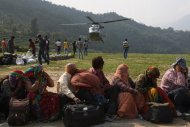
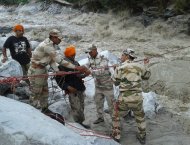
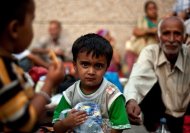
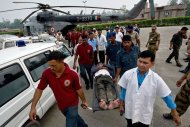
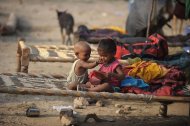
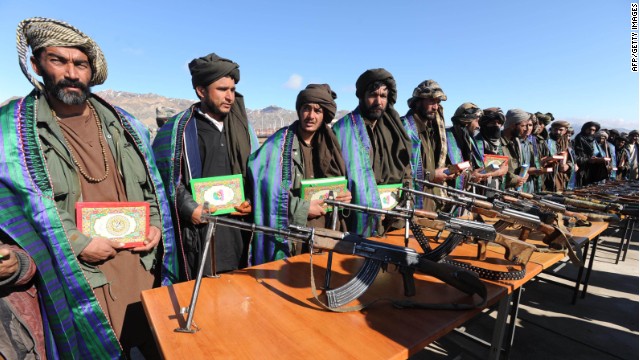
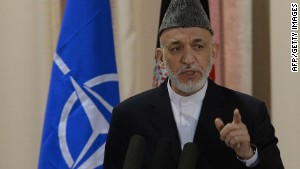






















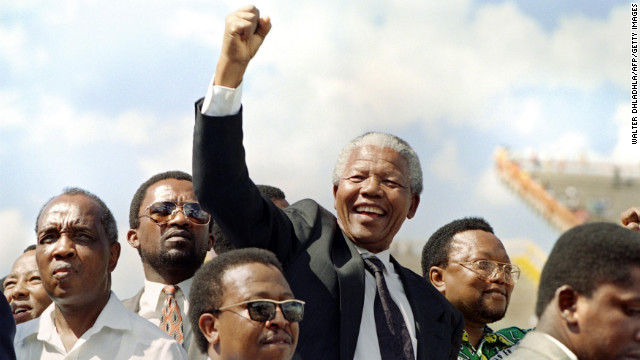 Nelson Mandela, now
94, endured 27 years in prison before becoming South Africa's first
president from 1994 to 1999. Pictured, Mandela in Mmabatho for an
election rally on March 15, 1994.
Nelson Mandela, now
94, endured 27 years in prison before becoming South Africa's first
president from 1994 to 1999. Pictured, Mandela in Mmabatho for an
election rally on March 15, 1994.
